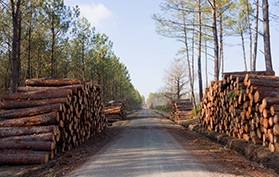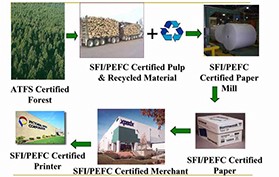ATFS Certification
The American Tree Farm System® works to sustain forests, watershed and healthy wildlife habitats through the power of private stewardship by offering affordable forest certification for family forest landowners in the United States. ATFS has undergone many changes since its beginnings in 1941 and is now internationally recognized as a credible forest certification system. For over 75 years, ATFS has enhanced the quality of America’s woodlands by giving forest owners the tools they need to keep forests healthy and productive. Third party certification through ATFS is one of these important tools. ATFS Certification is shown exclusively through listing of a forest in the ATFS Verification Database, which allows mills, wood dealers and other industry representatives the ability to quickly confirm that a forest has met the sustainability standards established by the ATFS.
American Tree Farm System Certification
ATFS is the United States' oldest family forest certification program. In 1941, ATFS began promoting responsible forest management on our nation’s private forests. ATFS certification gives family woodland owners confidence and validation that they are doing right by their land.
ATFS certification is now internationally-recognized and meets strict third-party verification and auditing standards. ATFS-certified family forests meet eight standards of sustainability and are managed for multiple purposes: water, wildlife, wood and recreation. ATFS is a strong network of woodland owners who share the same core values of hard work, community responsibility and commitment to protecting America’s forest legacy. Family woodland owners with ATFS certified forestland provide multiple public benefits from clean air and water, wildlife, to green jobs and forest products. We are building markets and advocating for ATFS certification to key decision makers in government and industry to support the commitment made by our network of stewardship minded landowners.
Certification Options
ATFS offers three ways to join the over 19 million acres of certified forestlands and to show your commitment to excellence in forest stewardship:
- State Tree Farm Committee programs - The State Tree Farm Committees support a network of foresters trained to provide on-the-ground validation of good forest practices. Currently, there are 42 active state committees working with 12.5 million acres on 38,000 Tree Farms across the U.S. Landowners can join the state program through an inspection of their property and forest planning documents.
- Independently Managed Group programs - The Independently Managed Group (IMG) program was started in 2002 and currently we have 12 IMGs certifying nearly 4.8 million acres. An IMG program is facilitated by a group manager who oversees landowner entry and exit into the IMG and coordinates certification audits.
- Individual third-party certificates - Individual family forest owners have the option to seek their own third-party certification. To obtain an individual certificate, landowners should contract directly with a qualified certification body and undergo certification audits every three years.

About CertificationForest certification is the certification of land management practices to a standard of sustainability. To obtain certification, an independent third-party needs to attest to the sustainable management of a working forest. Learn More |

Is ATFS right for your clients?ATFS has certification options to meet the forest certification needs of landowners, state agencies and organizations, and other natural resource organizations. Read More |
||

Chain of CustodyLand certified by the American Tree Farm System are a principle source of fiber for the Sustainable Forestry Initiative (SFI, Inc.) and PEFC chain of custody programs. Learn More |

Certification StandardsAmerican Tree Farm System's certification stanards recognize new conservation forestry practices and evolving consumer demand for sustainably harvested forest products. Learn More |
||


